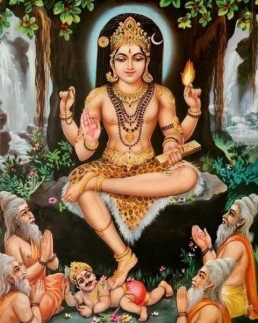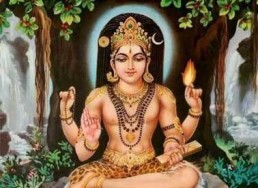Nidhaye Sarvavidyanam
गुरवे सर्वलोकानां दक्षिणामूर्तये नमः ‖
gurave sarvalokānāṃ dakṣiṇāmūrtaye namaḥ ‖

Description
Meaning of Dakshinamurti
Amürtih is the one who is formless and who is the truth of everything. With maya-sakti Isvara is daksinah, the one who has the capacity to be the creator and sustainer, and also the one who can take back the whole creation into himself. Therefore, Isvara who is daksina as well as amürti is Daksinamürti.
Daksina also means the southern direction. He is the Lord who is facing the south, daksinn-dik-abhi-mukha murtih. What is the significance of the southern direction? The north attracts, and it stands for moksha. The south stands for samsara; it is Lord Yama’s place. The Lord is everywhere, but the one who wants release from samsara faces the Lord in the north. The Lord has to face you to teach. As the source of all-knowledge, he faces the south. Salutations unto Lord Daksinamürti who is the source of all-knowledge and the source of all blessing.
Meaning of this Sloka
Nidhi means treasure-house or reservoir. Nidhaye is in the dative case which gives the meaning, unto the treasure-house, reservoir. Of what? Sarvavidyānām, of all knowledge.
Bhisaje bhavaroginam. A bhisak is doctor. The Lord is considered to be a doctor. He is the Vaidyanātha, the Lord of physicians. For what kind of disease? The bhavaroga, the disease of becoming, which is samsara. Bhavaḥ eva rogaḥ, bhavarogaḥ, a life of becoming alone is disease whose cause is self-ignorance. The Lord is the physician who cures the people suffering from the disease of samsāra; unto him the treasure-house of all- knowledge, nidhaye, namaḥ, salutations. Salutation unto the one who is the healer, whose grace removes this disease of samsāra, a life of becoming.
Gurave sarvalokānām.The word gurave means unto the Guru, the teacher, who is sarvalokānāṁ Guru, the teacher of all teachers. He is the jagad-guru, the one who is the source of all knowledge and who is the teacher of all. Unto that Dakṣiņāmūrti, (my) salutations.
Excerpt from the book “Prayer Guide” by Swami Dayananda
Other Dakshinamurthy Shlokams
Dakshinamurthy Stotram
Shlokams,Sankara,Shiva,Dakshinamurthy
The Dakshinamurti Stotra is a Sanskrit religious hymn to Shiva by Sri Adi Shankaracharya. It explains the metaphysics of the universe in the frame of the tradition of Advaita V
Ishvaro Guru Atmeti
Shlokams,Shiva,Dakshinamurthy,Guru,Sankara
Salutations to Lord Dakshinamurti, who is all-pervasive like space but who appears (as though) divided as Lord, Guru, and the Self.
Mauna Vyakhya
Shlokams,Sankara,Shiva,Dakshinamurthy
I salute Sri Dakshinamurti, who is not subject to time, who makes known the truth of Brahman through the implied meaning of words, who is surrounded by disciples who are themselves Rishis and committe
Om Namah Pranavarthaya
Shlokams,Sankara,Shiva,Dakshinamurthy
Om. Salutation to the one who is the meaning of praņava, who is in the form of pure knowledge, who is taintless and who is free from any change. To that Sri Dakshinamurti, (my) salutations.
Om Namo Bhagavate Dakshinamurthaye
Shlokams,Sankara,Shiva,Dakshinamurthy
Om. Salutations to Bhagavan Dakshinamurti. (Oh Lord) Bless me with memory, the capacity to think properly, and clarity, wisdom.
Nidhaye Sarvavidyanam – Dakshinamurthy – In Sanskrit, English Translation, Meaning, Significance and Audio. With commentary by Swami Dayananda

